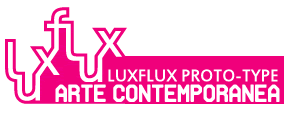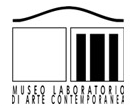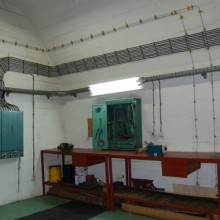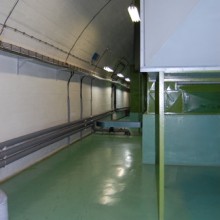Cultural event of Europe
For the first time ever the Council of Europe has awarded the CECEL label to a country from our region. The CECEL (Council of Europe Cultural Event Label) label is given only to a few exceptional projects and in August 2009 the committee selected three out of 18 candidates. One of the three selected is our Project “Biennale of Contemporary Art, D-O ARK Underground”. All promotion materials will therefore display the CECEL label (posters, leaflets, invitations, and press releases).
Place
The Biennale of Contemporary Art, D-O Ark Underground will be organized in Konjic, a small Bosnian town, in a military shelter named ARK, which the Yugoslav army built between 1953 and 1979. This shelter occupies a space of 6.500m2 and consists of 12 connected blocks. It resembles a complicated labyrinth, with residential areas, conference rooms, offices, strategic planning rooms, and other functional areas. The construction and existence of this bunker was kept secret until the 1990s, when ARK was finally revealed. ARK was built as a military bunker by the former Yugoslav People’s Army (JNA) to function as the Main Centre for Military Operations or Military Command and as the shelter for President Josip Broz Tito, his family and his closest associates in case of war. Located at a depth of 280 metres underground, the shelter is preserved intact with all its symbols and signs of our former social, economical, political and ideological system. Many monuments, especially those representing the recent political system, were destroyed during and after the war. ARK is therefore a unique exhibition space, in an untraditional framework of art both from a psychological and intellectual point of view.
Cultural identity
Regional as well as world famous artists will participate in the Biennale, and have the opportunity to react and make their personal comments on the history which this space symbolizes: on one side there is a country (Bosnia and Herzegovina) torn down, burned and economically demolished, and on the other side there is an ARK, a sanctuary completely preserved as the atomic command, engineered and built to survive attacks up to strike force of 25 atomic kilotons. In ex-Yugoslavia there are still very emotional discussions about the recent past. Those discussions mostly lead to new misunderstandings and conflict regarding the reasons which brought the country to war and the resultant rigid relationships between countries in the region. One of the main obstacles to social and democratic development of countries of the Western Balkans is overcoming and accepting the past. The general social and cultural identity was deeply disturbed by the fall of the previous political system and subsequent transitional processes. BiH is a country that is going through many dramatic changes and is slowly learning that its cultural identity lies in embracing its diverse elements. This Biennale will, through art and culture, question the prevalent attitudes towards history and create a path towards the rediscovery of continuity and cultural identity.
Network of the supporters
Experts will be chosen for lectures from countries which belonged to ex-Yugoslavia (Slovenia, Croatia, Serbia, Monte Negro, Macedonia, BiH), and also from other countries in the region (Greece, Albania, Bulgaria, Romania, Turkey) and the world. The Biennale will include the following programmes which will be staged in cultural institutions in a couple of cities of Bosnia and Herzegovina.
In Banja Luka the Museum of Contemporary Art of Republic of Srpska in Banja Luka and Gallery Collegium artisticum in Sarajevo seminars, lectures and talks with artists and art historians will take place. Open dialogue will focus on the position of marginal cultures (such as those from the Balkan region) in relation to the more dominant western cultures. Subjects will be important art themes and presentations of individual opuses and national scenes, as well as curatorial and author’s ways of making the exhibition.
The organizer of Biennale, KULT ZONA, also wishes to establish a dialogue with the international art scene. This will take place in various phases. The first phase is a meeting that will take place in December 2009, where art historians and art critics of contemporary Art will have the opportunity to be introduced to the ARK space.
Why this project should be supported?
Supporting the Biennale of Contemporary Art in Konjic, (BiH), will open new connections in this field of culture: The Biennale will promote open rethinking about the war and post-war period, principles of autonomy and equality, and the possibility will be open to promote regional Contemporary Art in the context of European values. Not only will the historical continuity of the ARK’s unique space be preserved but also the possibility to unite the region’s contemporary art exhibitions. We believe that this project will be recognized as an important one for its potential to promote better understanding between the nations of our region and between our region and Europe.
For BiH this project has great importance, because the realization and organization will be carried out by institutions and experts from both entities working together. The basis of any successful society is the acceptance of differences and the goal of this project is to promote human rights and tolerance. The Biennale Project in this way will not only help continuity of cultural identity but also promote values of democracy, understanding and social and cultural equality.
The social development of the Western Balkans has taken a different path compared to other regions in Europe, due to the many challenges these countries faced as a result of their recent history and their difficulty in accepting the need for change.
One of the main challenges to social and democratic development is overcoming and accepting the past. The countries of ex-Yugoslavia continue to struggle with political issues brought about by the recent war. We, the organizers of the Biennale, believe that if artists from the Western Balkan region can have the opportunity to express their feelings and thoughts, this could potentially serve as a catalyst to bring about open dialogue and understanding about the past and the future among the general population.
Participating artists would be able to explore issues related to the past and the present as they work within the Atomic Shelter in Konjic. Of course, artists will respond individually to this setting for they will bring with them their own experiences of the past and their own hopes for the future. In some cases they may wish to collaborate. They will certainly all have to cooperate with each other in this unusual space, so that each of them can work as they wish to on site. They will provide an example of teamwork and group cooperation and collaboration to those who view their work in this setting from the past. These artists both individually and as a group, will gain an understanding about each other which could well be reflected in their creative work.
Cultural link
Culture should bring people together. The current situation in BiH is tense because in our opinion the politicians in our region like to evoke old feelings and rhetoric from the recent war. All the countries belonging to ex-Yugoslavia were once culturally and economically interconnected and it is natural that they should be again in the future. This Biennale should demonstrate how similar these countries are and how hopeful and positive many people really are. We believe that when regional tensions are lessened and the economy starts to function, ordinary people will start to think in a different way, not just about nationality; there will no longer be “borders” in their heads. The cultural connections and the dialogue that will result from the Biennale will play a role in this growth.
The artworks created in the Atomic Shelter should intrigue visitors to the Biennale, and promote their thinking in terms of the past and the future. We are also planning to promote special organized visits to the Biennale in Atomic Shelter in Konjic by the primary and secondary schools from both BiH entities and if possible from neighbouring countries (Serbia, Croatia, Macedonia, Monte Negro, Slovenia).
We have established a number of affiliations for this project. The Ministry of Civil Affairs, which is the only ministry at the state level which has taken on the role of a ministry for culture suggested that we present this project. The Ministries for Culture and Sport of the Federation of BiH and Canton Sarajevo have given us written support and indicated readiness to provide financial support for the project. The city of Konjic and its Mayor are willing to help with the logistics for the Biennale since they are well aware that this event will help to promote both their city and its beautiful local scenery.
Partners
The Centre for Cultural Decontamination, Belgrade, Republic of Serbia is our partner in organizing the Biennale of Contemporary Art. It is planned to organize the Biennale in several segments. Prior to the actual exhibition at the Atomic Shelter, round tables and lectures will be organized where art historians, art critics, architects and philosophers will give the answers to questions about the Biennale of Contemporary Art in Konjic and its open approach to the questions regarding the past and future in this region. The Center for Cultural Decontamination from Belgrade with its rich experience in organizing various intellectual and expertise lectures, is well known for its capability to produce this type of programme.
Our associates in BiH are the Museum of Contemporary Art of the Republic Srpska in Banja Luka, the Center for Contemporary Art Sarajevo (SCCA) and the Gallery Collegium Artisticum in Sarajevo.
The Board of Biennale has named the following selectors of the Biennale:
• Mr. Branislav Dimitrijevic (Art Historian) from Republic of Serbia
• Mr. Petar Cukovc (Art Historian) from Montenegro
• Mr. Jusuf Hadzifejzovic, (Artist) from Bosnia and Herzegovina.
We are pleased to note that during this intensive initial stage of planning and organizing our application for the Biennale we have experienced good relationships and strong support from our partners, local government and high level cultural and political offices. This demonstration of support and exchange of ideas between cultural centres and leaders in our region has made us feel confident about the success of this project, should we be able to proceed with it.
The Biennale of Contemporary Art is based on principles of strengthening positions of cultural centres of Contemporary Art in BiH. Through joint work, exchange of knowledge and experience with regional centres of Contemporary Art, a synergy will be created with the goal of establishing new standards and solidifying our country’s contemporary art position both in the region and abroad.
We have discussed our project with foreign journalists and curators from around the world and believe that contemporary art authorities from Europe share our view that this Biennale will be innovative and diverse. Our first step will be to organize a meeting in December 2009 at the Atomic Shelter in Konjic where we will introduce curators, art critics and journalists to the site. We will share with them the strong message of this project: that this top secret military installation is going to be occupied not by an army but by artists. We also will share with them our objective of providing regional artists with the opportunity to enter a wider creative world and also to provide them with a microphone to speak to the world about their experiences living in this region.
Preparation and goals
We the organizers, Association for promotion of Visual Art KULT ZONA, have already started with exhibitions in our Gallery Charlama Depot in Sarajevo, during the last year. We had 12 exhibitions, where artists from ex-Yugoslavia together with artists from Europe were exhibiting their art works.
Information Centre for the ARK Underground Atomic Shelter will be in City Gallery Collegium Artisticum Sarajevo. This Information Centre will be provided with the map of the Atomic Shelter showing the positions of all the artists and their works, documentation, photographs and written texts on the historical relevance of the shelter. Furthermore a 30 minutes documentary film will be shown about the location itself together with statements by the artists and curators. A similar Information Point will be established within the Museum of Contemporary Art in Banja Luka and in the Centre for Cultural Decontamination, Belgrade, Republic of Serbia, as well other Info Points are planned to be created in all capitals of the partner countries (Serbia, Slovenia, and Croatia) during the Biennale itself in Konjic and around Europe.
Sarajevo has once again become a tourist destination and every year more and more visitors are coming to explore the city and its cultural offerings. International audiences can be easily reached through promotion on the web and also through the media of the press and TV since we are planning to involve international curators and art critics to comment on the idea of the project and the exhibition in the ARK Underground Shelter. We will involve different generations of artists, art critics and curators as well as philosophers, sociologists and cultural anthropologists in those discussions. Our goal is to stimulate dialogue on the overlapping of art and history and their consequences in today’s society in the Western Balkans region. We will use the powerful symbolic image of the Atomic Shelter to foster such dialogue.
Intercultural dialogue
This Project should bring about a higher level of understanding and intercultural dialogue between countries in the region. Bearing in mind that BiH in terms of developed standards is behind all countries from our region, we believe that this Project could help us to make a step forward in bringing BiH closer to European proclaimed values: democracy, understanding and tolerance.
Potential for development
This project will provide the possibility to develop culture and tourism in small centres. Redirecting large international cultural events from the centre to the periphery and engaging public focus on the small Bosnian town of Konjic will create a new dimension in the promotion of culture and contemporary art and a real potential for tourism will follow.
We plan to describe and promote the city of Konjic, which is a 45-minute drive from Sarajevo. There will be organized transportation for the public and visitors to the Biennale every day from Sarajevo to the Atomic Shelter in Konjic. There is very easy access to the Shelter where the Biennale will take place. The Shelter is situated next to the river Neretva, and therefore we think that the natural beauties of the site would attract more visitors to Konjic, not just during the period of the Biennale. The cooperation of individuals, the private, social and business sectors, non profit organizations, state and local institutions in the realization of the project “Biennale of Contemporary Art” is of great importance. Relocating such a big international cultural event to Konjic will provide a new approach to the promotion of Culture and Contemporary Art. With its natural beauty (the river Neretva, Jablanicko and Boracko Lakes, the Bjelasnica and Prenj mountains, and Treskavica, a canyon of the Raketnica creek), Konjic is the cradle of the old state of Bosnia. It contains the ruins of a necropolis and Stecaks, and a variety of monuments from pre-history, the Roman period and the period under the Ottoman and Austro-Hungarian Empires. The state of BiH will benefit from the opportunity to work on a project at this level.
Documentation
Documentation will make the project visible in terms of organization and for future Biennale projects. Apart from administrative and press clipping citations, the documentation will record the work process, artists profiles and completed works.
Promotion and PR Marketing
As a result of careful promotion during the organization of the Biennale, the following will be achieved:
– Better quality of the production and presentation of Contemporary Art in BiH.
– Positioning of BiH Contemporary Art on a regional level.
– A platform for live dialogue between artists and art professionals, participants of the Biennale and government representatives, potential sponsors and cultural workers.
– Improvement of capacity for partners and Biennale participants.
Web Portal
The WEB portal provides the possibility to promote BiH cultural institutions and centres, and other potential capacity to initiate and achieve cooperation in the region. The WEB portal provides wider accessibility for information, visibility, and involvement of other centres that are not direct implemetators of the first “Biennale of Contemporary Art”.
Psychological stability
The intensive joint work carried out even at the preparation stage of the Biennale’s organization, highlights the strong involvement of partners, local governments and high level cultural and political offices in guaranteeing the success of this project. This project creates a forum to connect institutions within BiH through cooperation and revitalizes cultural life in smaller places (such as Konjic). In this respect some results have already taken place and an exchange of ideas has been established between partners in the organization of the Biennale.
Economic stability
Economic stability depends on direct and indirect activities to ensure the project’s survival. With special attention to potential support from private, social and business sector (through branding) sources, we will direct activities through PR and marketing. The Project “Biennale of Contemporary Art” will send its voice into the world, and it is expected that interested local entities will participate in the Project’s organization.
Indirectly some actions and focus provide an approach to other sources:
– With the Bosnian Biennale, organized with partners from the Republic of Serbia, becoming a reality, funds from the EU should be available to ensure regional and cultural cooperation.
– With professional presentation and the branding of the project, there is possibility of accessibility to other foreign funds.
– Involvement of potential Bosnian business partners and their support in realization of Biennale (BH Telecom, Tobacco Factory Sarajevo, Bosnalijek)
– Establishing resources and developing a new approach is essential for the existence of the project and for future Biennale projects.
Innovations in the wider social context
With regard to a wider context for Biennale organization, the following will be realized:
– The gathering of different sources: The cooperation of individuals, private, social and business sectors, non profit organizations, state and local institutions in realization of the project Biennale of Contemporary Art is of great importance.
– The Biennale’s venue is a valuable idea and will shift prime culture from the centre to the periphery.
– Regional importance is produced through a network of partners, which will strengthen the alliance of smaller local and larger regional cultural centres.
– The project will provide the possibility to develop culture and tourism in small centres. Redirecting big international cultural events from the centre to the periphery and drawing public attention to the small BiH town of Konjic, a new dimension in the promotion of culture and contemporary art, and real tourism potential will follow. With its natural beauties (the Neretva River, Jablanicko and Boracko Lakes, mountains Bjelasnica, Prenj, Treskavica, Canyon of Raketnica creek), Konjic is the cradle of the old state of Bosnia. In its vicinity are the remains of necropolises and Stecaks, prehistoric monuments, Roman artifacts, and relics of the Ottoman and Austro-Hungarian empires.
– The Biennale of Contemporary Art will open new connections in the field of culture: It will promote open thinking about the war and post-war period, principles of autonomy and equality, and the possibility for the promotion of regional contemporary art in the context of European values. In ex-Yugoslavia there are still emotional discussions about the recent past events. Those discussions mostly lead to new misunderstandings and a lack of understanding regarding the reasons that brought our country to war and the post-war hardening of relationships between countries in the region.
Contemporary art links people to global culture and so it encourages artists from small communities to enter a wider stream of creativity. The Biennale wishes to provide Bosnian artists with a road towards global culture, and, at the same time, give them a microphone to speak to the world.




